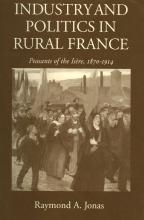French socialism in the nineteenth century was largely confined to its Parisian adherents, but the process of industrialization in rural France began to create opportunities for socialists to expand their movement after the fall of the Paris Commune in 1871. In this book Raymond Jonas offers a study of socialist success by focusing on one department in southeastern rural France, the Isère, where the silk industry converted peasants into workers and brought a thriving and dynamic local economy to towns, villages, and hamlets. Jonas shows how women's wages arrested the rural exodus because they subsidized peasant farming and gave women a powerful lever with which to reshape household relations and village society.
Industry and Politics in Rural France, 1870-1914 (Cornell, 1994) subverts the conventional story of the making of the European working class by focusing on unconventional members of it.
